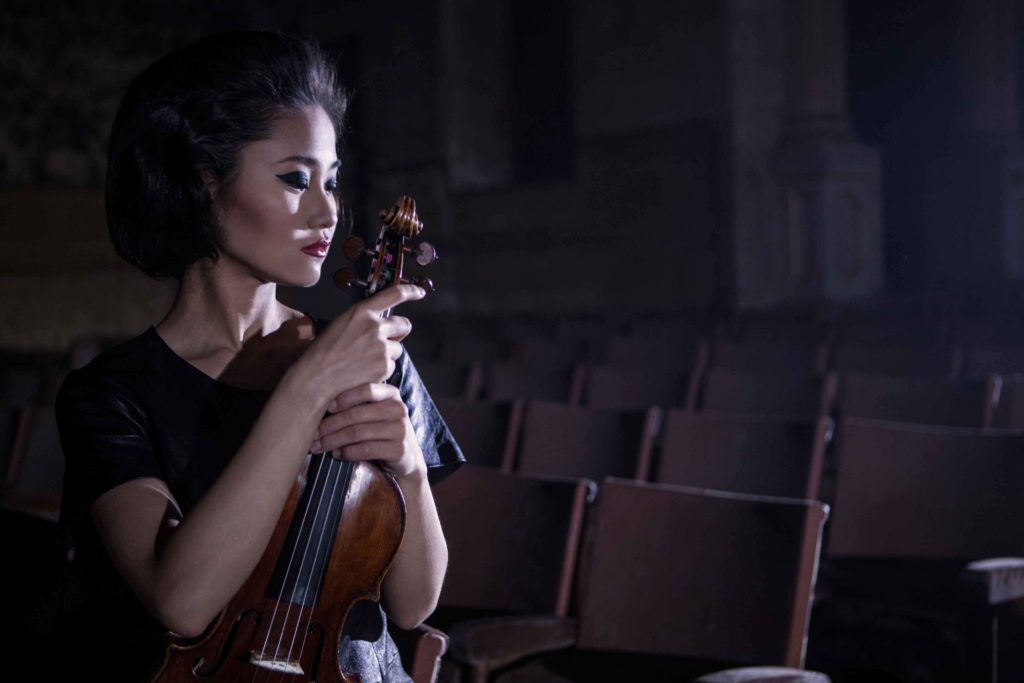by Jarrett Hoffman

The soloist is a familiar face. Sayaka Shoji — first prize winner at the 1999 Paganini Competition — has in recent years joined CityMusic for the Brahms and Tchaikovsky concertos.
We last spoke to her in 2015 in a wide-ranging conversation that touched on her Japanese, Italian, and German upbringing (she now lives in Paris), her interest in jazz, the beginning of her solo career, her early dream of singing opera, and her previous work with Dorman — including commissioning a violin sonata from him.
I caught up with Shoji over email, and began by asking about the first time she heard Dorman’s music — in Verbier, Switzerland, where they met.
Jarrett Hoffman: You told us in 2015 that the first piece you heard by Dorman was his percussion concerto at Verbier. What attracted you to his music then, and what continues to attract you to it?
Sayaka Shoji: I’m strongly attracted to the mystic power in Avner’s music. His musical language is prayerful, cosmopolitan, and part of the contemporary era, but it isn’t just notes after notes, nor does it try to be original for the sake of being original. It stimulates my visual imagination and evokes reminiscences and emotion — that is essential for me when I listen to music.
JH: When giving a world premiere of a piece that was written for you, what balance do you strike between your own personal interpretation and trying to convey exactly what’s on the page?
SS: It’s difficult for me to separate what’s written by the composer and my own interpretation. What I play is always what I understand from the score. The good thing about learning a piece by a living composer is that whenever I have a question, I can just call. When I play Mozart or Beethoven, I try to call them also, but the conversation becomes more like one with God.
JH: Dorman writes that the piece explores the idea of mental stillness, as related to Buddhist traditions, some Western philosophies, and meditation. [Read the full program notes here.] How much do you consider programmatic aspects of music when you perform?
SS: I believe in programmatic music as long as the music is as strong as the program — only when it helps to understand more about the music. Music should come from somewhere, and the audience should be able to feel some source of inspiration when listening to the music. I’m very skeptical when I can’t feel anything from the music alone without reading the explanation — or in the worst case, after reading it ten times. I have the same point of view for contemporary visual art.
JH: You’ve performed with CityMusic several times over the past five years. What stands out to you about coming to play with this orchestra?
SS: I’ve been hoping to play a new violin concerto by Avner one day, so I’m very happy that finally it’s happening. Now I also know the musicians — they are very kind and motivated to make music. The ensemble is fulfilled with good energy. It’s always a pleasure to work together.
~ ~ ~
Next week’s program, titled “Wide Horizons,” also includes Takemitsu’s Waltz and Poulenc’s Sinfonietta.
Performances take place Wednesday, March 13 at 7:30 pm (St. Jerome Church in Collinwood), Thursday, March 14 at 7:30 pm (Maltz Performing Arts Center in University Circle — tickets required), Friday, March 15 at 7:30 pm (Lakewood Congregational Church), Saturday, March 16 at 8:00 pm (Shine Church of St. Stanislaus in Slavic Village), and Sunday, March 17 at 4:00 pm (St. Noel Church in Willoughby Hills). More info here.
Published on ClevelandClassical.com March 4, 2019.
Click here for a printable copy of this article


